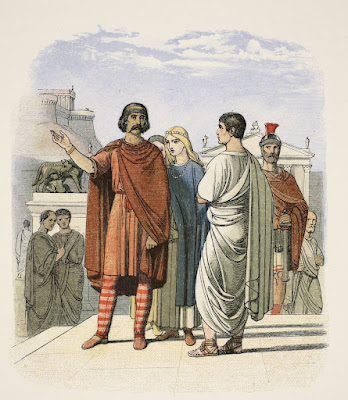[i] The third person reflexive pronoun i.e. the equivalent of ‘himself, herself, itself, and themselves’ is given below; note [i] the 3rd person reflexive pronoun distinguishes neither gender nor number, and [ii] there is no nominative since the reflexive pronouns refer back to the subject of the sentence.
Nominative: -
Genitive: suī
Dative: sibi
Accusative: sē;
sēsē
Ablative: sē; sēsē
[ii] Examples:
Sē ex nāvī prōiēcit. (Caesar) │ He threw himself from the ship.
Dumnorīgem ad sē vocat. (Caesar) │ He calls Dumnorix to him
(i.e. to himself).
Sēsē castrīs tenēbant. (Caesar) │ They kept themselves in the camp.
Cōpiam frūctuum sibi cōnficiunt. │ They collect a
supply of fruit for themselves.
Per sē labor perfecit. │ He completed the task by his own effort (i.e.
by means of himself).
Puer in flūmine sē lavat. │ The boy is washing (himself)
in the river.
[iii] As with
other pronouns, when cum is used with the ablative reflexive pronoun sē,
it is attached to the end of the pronoun:
Sēcum: with himself / herself / itself / themselves
Dūxit sēcum virginem.
│ He took the young woman with him (i.e. with himself).
Exercise
Give an
appropriate translation of the reflexive pronoun.
[1] Dea in lacū
sē spectat. │ She gazes ____ ____ in the lake.
[2] Dīves sibi
pecūniam dedit. │ The wealthy man gave ____ the money.
[3] Nauta in mare sē
praecipitāvit. │ The sailor threw ____ into the sea.
[4] Vōcālis
syllabam per sē facere potest. │ A vowel can make a syllable ____
____.
[5] Dominus servum
ad sē vocāvit. │ The master called the slave ____ ____.
[6] Obsidēs in
carcere sēsē necāvērunt. │ The hostages killed ____ in the prison.
[7] Pater fīlium sēcum
dūxit. │ The father took his son ____ ____.
[8] Rēx magnās
dīvitiās sibi obtinuit. │ The king acquired great riches ____ ____.
[iv]
Latin has no separate 1st and 2nd person reflexive
pronouns; the personal pronouns are used. Again, note in the examples where
English does not always express the reflexive pronoun if the context is clear.
Mortī mē obtulī. │ I have exposed myself to death.
Dōnum mihi tenēbō. │ I shall keep the gift for
myself.
Mihi numquam ignōscam. [ignōscō,-ere (3) + Dative] │
I shall never forgive myself.
Quōmodo tē habēs hodiē? │ How are you (i.e.
how are you holding yourself) today?
Cūr tē in spēluncā cēlāvistī? │ Why did you
hide (yourself) in a cave?
Cūr tibi persuādēre nōn potes? [persuādeō,
-ere (2) + Dative] │ Why can’t you convince yourself?
Nōs numquam culpābimus. │ We shall never blame ourselves.
Nōs ad septentriōnēs vertimus. │ We turned (ourselves)
to the north.
Nōbīs numquam ignōscēmus. [ignōscō,-ere (3) + Dative]
│ We shall never forgive ourselves.
Vōs fraudāvistis. │ You’ve cheated yourselves.
Date vōbīs virōs sapientēs et gnārōs. │ Give
yourselves wise and experienced men.
Exercise
Complete the Latin sentences with the appropriate reflexive pronoun.
[1] ____ rogāvī iterum iterumque. │ I asked myself again and again.
[2] ____ domum
aedificāvī. │ I’ve built a house for myself.
[3] Pōtēsne ____
in speculō vidēre? │ Can you see yourself in the mirror?
[4] Cūr ____ nōn ignōscētis?
[What case is used with ignōscō, -ere?]│ Why will you not forgive yourselves?
[5] Vertite ____
ad mē. │ Turn (yourselves) to me.
[6] ____ in
plūribus fallimus. │ We are wrong (i.e. deceive ourselves) in many
things.
[7] Parce ____. [parcō,
-ere [3] + Dative] │ Forgive yourself [ = be lenient to yourself].
[8] ____
persuādēre nōn possumus. [What case is used with persuādeō, -ēre?]│ We can’t
convince ourselves.
nōs; nōbīs;
mihi; mē; vōs; vōbīs; tē; tibi
____________________
[1] Mē rogāvī
iterum iterumque. │ I asked myself again and again.
[2] Mihi
domum aedificāvī. │ I’ve built a house for myself.
[3] Pōtēsne tē in speculō vidēre? │ Can you see yourself
in the mirror?
[4] Cūr vōbīs
nōn ignōscētis?│ Why will you not forgive yourselves?
[5] Vertite vōs
ad mē. │ Turn (yourselves) to me.
[6] Nōs in
plūribus fallimus. │ We are wrong (i.e. deceive ourselves) in many
things.
[7] Parce tibi.
│ Forgive youself.
[8] Nōbīs persuādēre
nōn possumus. │ We can’t convince ourselves.





















